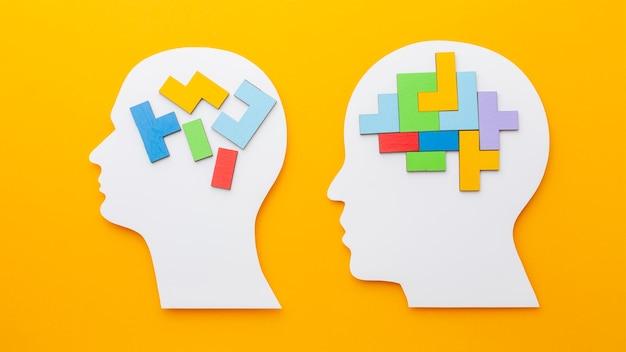Psychology, the scientific study of the mind and behavior, offers a fascinating exploration into the depths of human nature. It allows us to delve into the complexities of our thoughts, emotions, and actions, ultimately helping us understand ourselves and others better. Whether you’re interested in pursuing a career in psychology or are simply curious about this field’s relevance to everyday life, we’ve got you covered.
In this blog post, we will embark on a journey to uncover the four main psychological theories that form the foundation of this captivating discipline. We’ll also explore the pros and cons of choosing psychology as a career path and examine its utility in our daily lives. So, let’s dive in and unravel the secrets of the mind and behavior together.
But first, let’s address the elephant in the room. Is psychology really worth pursuing? What are the overall pros and cons of choosing this field? Stick around as we weigh the benefits and drawbacks to help you make an informed decision about your future endeavors.

What Are the Four Psychological Theories?
Overview of the Four Psychological Theories
In the world of psychology, there are several theories that help us better understand the complexities of the human mind. These theories are like toolboxes for psychologists, providing different frameworks and perspectives to analyze and explain human behavior. Let’s take a closer look at four of the most influential psychological theories and how they shape our understanding of the mind.
1. The Psychoanalytic Theory
Sigmund Freud, the master of dreams and uncovering the hidden corners of our psyche, is the brains behind the psychoanalytic theory. According to Freud, our behavior is dictated by unconscious desires and unresolved conflicts from early childhood experiences. Picture your mind as an iceberg – what you see above the surface are your conscious thoughts, but beneath the water lies a mysterious world of unconscious motives. Cue the dramatic music!
2. The Behaviorist Theory
Move over, Pavlov’s dogs! The behaviorist theory, championed by psychologists like B.F. Skinner, focuses on observable behavior and external influences. This theory suggests that our actions are shaped by our environment through a process called conditioning. Think rewards and punishments, like when you totally aced that test and your teacher gave you a gold star. Behaviorists believe that our behavior can be controlled and modified through careful manipulation of the environment. Sounds a bit like a reality TV show, right?
3. The Cognitive Theory
Ah, the cognitive theory, where our inner thoughts and mental processes take center stage. Developed by Jean Piaget and other cognitive psychologists, this theory emphasizes the importance of our mental processes in shaping our behavior. It suggests that our thoughts, beliefs, and perceptions influence how we interpret and respond to the world around us. Imagine your mind as a fancy supercomputer, analyzing and processing information in lightning speed. Be careful, though – don’t overload the system with too many cat videos!
4. The Humanistic Theory
Last but not least, we have the humanistic theory, which takes a more touchy-feely approach to understanding human behavior. Think of Carl Rogers and Abraham Maslow, the founding fathers of this theory, as your friendly neighborhood therapists. Humanists believe that we are all driven by the pursuit of self-actualization and personal growth. They emphasize the importance of individuality, self-esteem, and the fulfillment of our unique potential. It’s all about embracing your inner flower power and living your best life!
Wrapping Up
And there you have it, folks! We’ve taken a whirlwind tour through the fascinating world of the four psychological theories. From hidden unconscious desires to external rewards and punishments, from intricate mental processes to the pursuit of self-actualization, these theories offer valuable insights into what makes us tick. So, the next time you find yourself pondering the mysteries of the human mind, remember to whip out your trusty psychological toolbox and see which theory fits the situation best. It’s like being your very own Sherlock Holmes of the psyche!

FAQ: What are the Four Psychological Theories?
Psychology is a fascinating field that seeks to understand human behavior and the mind. In this FAQ-style section, we will explore some common questions about psychology and delve into the four prominent psychological theories for a comprehensive understanding of this subject. So, let’s dive right in!
What are the Overall Advantages and Disadvantages of Choosing Psychology
Choosing a career in psychology has its perks and drawbacks. Let’s take a closer look at both sides:
Pros
- Insight into Human Behavior: By studying psychology, you gain a deeper understanding of why people think, feel, and behave the way they do, making you a pro at interpreting human behavior.
- Helping Others: Psychology provides you with the tools to support and improve the lives of individuals struggling with mental health issues or personal challenges.
- Diverse Career Opportunities: With a psychology degree under your belt, you open doors to a wide range of career paths, such as counseling, research, human resources, and even marketing.
Cons
- Emotional Weight: Working with individuals facing difficult situations can take an emotional toll on psychologists, requiring them to practice self-care to maintain their well-being.
- Lengthy Education and Training: Becoming a psychologist typically involves years of education, training, and field experience, demanding dedication and perseverance.
- Challenges in Objectivity: Remaining objective while working with clients can be difficult, as personal biases may unconsciously influence therapeutic practices.
Is Psychology Beneficial in Daily Life
Certainly! Psychology is not just for professionals; it offers valuable insights for everyday life. Here’s how it can benefit you:
Problem-Solving Skills
- Through psychological principles, you can enhance your problem-solving skills. You’ll learn to assess situations, consider different perspectives, and make informed decisions.
Improved Communication
- Understanding psychology helps you grasp the intricacies of human communication. It teaches you to listen effectively, empathize, and express your thoughts in a clear and concise manner.
Personal Growth and Self-Awareness
- Psychology enables self-reflection, leading to personal growth and increased self-awareness. By comprehending your emotions, behaviors, and motivations, you can make positive changes in your life.
What are the Five Major Approaches of Psychology
In the world of psychology, there are five major approaches that provide different lenses for understanding human behavior:
1. Psychoanalysis
- This approach, developed by Sigmund Freud, focuses on the unconscious mind and its influence on behavior. It explores repressed memories and unresolved childhood experiences.
2. Behaviorism
- Behaviorism concentrates on observable behaviors and their association with environmental stimuli. It examines how rewards, punishments, and conditioning shape human actions.
3. Humanistic Psychology
- Humanistic psychology emphasizes an individual’s potential for personal growth and self-actualization. It focuses on human uniqueness and the importance of empathy and understanding.
4. Cognitive Psychology
- Cognitive psychology explores mental processes such as thinking, problem-solving, memory, and decision-making. It investigates how we perceive, process, and store information.
5. Biological Psychology
- Biological psychology investigates the biological foundations of behavior and mental processes. It explores the role of genes, hormones, and the brain in shaping human cognition and actions.
What are the Four Psychological Theories
Psychology is a vast field that encompasses several theories. Let’s dive into four prominent ones:
1. Psychodynamic Theory
- Proposed by Sigmund Freud, the psychodynamic theory suggests that our behavior is influenced by unconscious drives and desires. It emphasizes the role of early childhood experiences in shaping personality.
2. Behaviorism Theory
- Behaviorism, founded by B.F. Skinner and John B. Watson, focuses on observable behavior and external environmental factors. It suggests that behavior is a response to rewards, punishments, and conditioning.
3. Humanistic Theory
- The humanistic theory, advocated by Carl Rogers and Abraham Maslow, emphasizes individual growth, self-actualization, and the importance of personal experiences. It suggests that individuals strive for personal fulfillment and self-worth.
4. Cognitive Theory
- Cognitive theory, pioneered by Jean Piaget and Albert Bandura, explores mental processes such as thinking, memory, and problem-solving. It suggests that internal mental representations influence our behavior.
How Can I Assess My Self-Worth
Assessing your self-worth can be challenging. Here are a few tips to help you navigate this journey:
Recognize and Challenge Negative Self-Talk
- Learn to identify negative thoughts and replace them with positive and affirming ones. Remind yourself of your accomplishments, strengths, and unique qualities.
Practice Self-Care and Self-Compassion
- Engage in activities that nourish your mind, body, and soul. Treat yourself with kindness, understanding that everyone has flaws and makes mistakes.
Surround Yourself with Supportive People
- Surrounding yourself with positive and supportive individuals who appreciate you and celebrate your achievements can significantly boost your self-worth.
How Can Psychology Help Me Find My True Self
Psychology offers several tools to help you embark on a journey of self-discovery:
Self-Reflection and Journaling
- Engage in self-reflection by journaling your thoughts, feelings, and experiences. This practice can help you gain insight into your values, beliefs, and personal aspirations.
Seek Professional Guidance
- Psychologists and therapists can provide guidance and support in your quest to find yourself. They offer effective strategies, exercises, and insights to facilitate self-discovery.
Explore Your Passions and Interests
- Delve into activities that ignite your passion and interest. Exploring different hobbies and experiences can help you uncover aspects of your personality that were previously unknown.
What is Self-Psychology
Self-psychology is a psychological theory developed by Heinz Kohut, focusing on the development and maintenance of a healthy self. It highlights the significance of self-esteem, self-objects, and empathic relationships in fostering psychological well-being.
What are the Goals of Psychology
The primary goals of psychology are to:
Understand Human Behavior and Mental Processes
- Psychology aims to unravel the complexities of human behavior, thoughts, emotions, and mental processes to gain a comprehensive understanding of what makes us tick.
Apply Findings to Benefit Individuals and Society
- Psychology strives to apply its knowledge to improve the well-being of individuals and society as a whole. It seeks to promote mental health, enhance performance, and foster positive relationships.
Create More Effective Therapeutic Interventions
- By continually advancing research and knowledge, psychology aims to develop more effective therapeutic interventions to treat mental health disorders and enhance overall psychological well-being.
Understanding the intricacies of psychology is like embarking on a thrilling journey into the depths of the human mind and behavior. By familiarizing ourselves with the four psychological theories and their significance, we gain valuable insights into what drives us as individuals. So, keep exploring, questioning, and delving into the vibrant field of psychology to unravel the mysteries of the human psyche!
